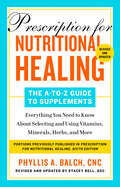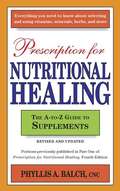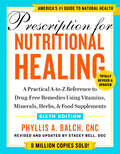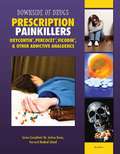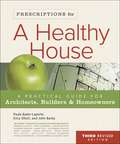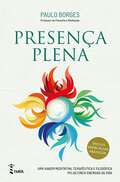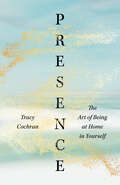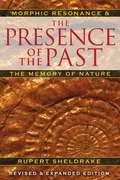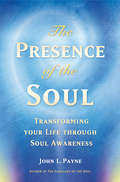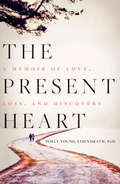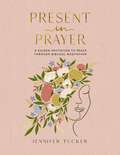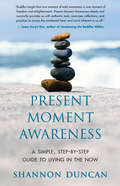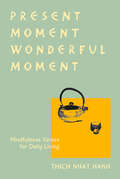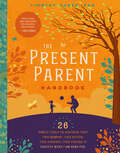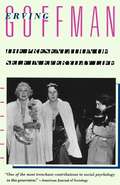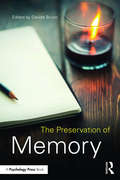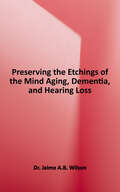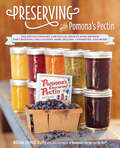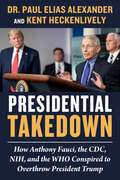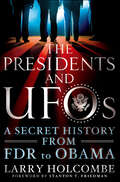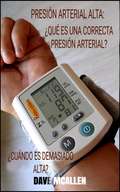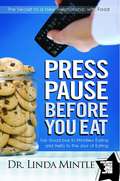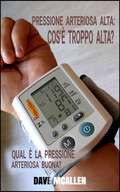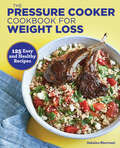- Table View
- List View
Prescription for Nutritional Healing: Everything You Need to Know About Selecting and Using Vitamins, Minerals, Herbs, and More
by Phyllis A. BalchCompletely updated for the twenty-first century—a convenient, pocket-sized edition of the nation&’s most trusted guide to holistic health. For decades, millions of people have turned to Prescription for Nutritional Healing for natural remedies to improve their health. This portable A-to-Z reference guide of the most commonly available types of nutrients, dietary supplements, and herbs puts that information at your fingertips. Drawn from the newly revised Prescription for Nutritional Healing, Sixth Edition, it includes:recent scientific discoveries about vitamins A, C, D, and B12, as well as biotin, coenzyme Q10, and calciumthe newest information on herbs, such as turmeric, ashwagandha, lemongrass, and St.-John&’s-wort; flaxseeds and oils; and sugar substitutes, including stevia and monk fruitup-to-date research on natural approaches to weight lossscience-based information about COVID-19 Whether you are looking for relief from a specific ailment or simply to achieve and maintain optimum health, Prescription for Nutritional Healing: The A-to-Z Guide to Supplements quickly provides access to everything you&’ll need to design a complete nutritional program.
Prescription for Nutritional Healing: The A-to-Z Guide to Supplements
by Phyllis A. BalchThis book gives information on all the most important supplements available today. It details what a particular supplement is, what forms it comes in and how to use it, as well as when not to use it.
Prescription for Nutritional Healing, Sixth Edition: A Practical A-to-Z Reference to Drug-Free Remedies Using Vitamins, Minerals, Herbs, & Food Supplements
by Phyllis A. BalchThe nation&’s #1 bestselling guide to natural remedies, totally revised and updated.This fully revised edition includes both time-honored, proven strategies and the latest science to arm you with the best natural therapies for your health. In this volume—a reference work of unparalleled authority—the updated material includes:natural ways to lessen the severity of Alzheimer&’s symptomscutting-edge information about COVID-19 and other viral infections as well as practical ways to help your body cope with acute and long-term symptomsnutritional information on menopause and breast and prostate cancersscience about chronic fatigue syndrome (CFS) and fibromyalgia (FMS) and how you can gain more control over your symptoms Prescription for Nutritional Healing, Sixth Edition, is the source for accessible, evidence-based information that serves as a guide for using natural nutritional remedies to achieve and maintain wellness.
Prescription Painkillers: Oxycontin®, Percocet®, Vicodin®, & Other Addictive Analgesics
by Rosa WatersJust because a drug is legal, doesn't mean it's safe to abuse it. Abusing prescription painkillers like OxyContinTM, PercocetTM, and VicodinTM is no safer than trying much harder drugs. These drugs are being vastly abused and represent one of today's largest drug epidemics. Discover the real consequences of taking prescription painkillers to get high. Learn about the damage these pills can do to your body and how you can develop an addiction to painkillers. Find out about the downside of prescription painkillers!
Prescriptions for a Healthy House: A Practical Guide for Architects, Builders & Homeowners
by Dr Erica Elliott John Banta Paula Baker-LaporteAlthough there is nothing complicated about constructing healthier homes, building for health is still not standard practice, and in fact there are many aspects of conventional home construction that are detrimental to human well-being.From foundation to rooftop, to home care and repair, Prescriptions for a Healthy House takes the mystery out of healthy-house building, renovation, and maintenance by walking the owner/architect/builder team through the entire construction process. Chapters include:Frame construction alternativesThermal and moisture controlFlooring and finishesFurnishingsThe authors--an architect, medical doctor, and restoration consultant--bring a singular combination of expertise and perspectives to this book. The result--now in its third completely updated edition--is a unique guide to creating healthy indoor and outdoor spaces, including many new resources, as well as specialized knowledge from several nationally recognized experts in the field of building biology.This unique guide will appeal to architects, designers, contractors, medical professionals, and homeowners.Paula Baker-Laporte is the principal architect and founder of Baker-Laporte & Associates and EcoNest Design. John Banta is a senior indoor environmental consultant for Restorations Consultants, Inc. Erica Elliott, MD is a medical doctor specializing in environmental medicine and family practice.
Prescriptions for Independence: Working with Older People Who Are Visually Impaired
by Nora Griffin-Shirley Gerda GroffPrescriptions for Independence: Working with Older People Who Are Visually Impaired has been designed to provide comprehensive information in a clear and readable way so that visually impaired people, their friends and families, and those who work with them have simple suggestions within easy reach. Readers will find that most people who are visually impaired do have usable vision and do not require special assistance, but they will also find what they need to know about common forms of visual impairment and adaptations and information that are useful to some visually impaired people in daily life.
Presença Plena
by Paulo Borges«Façamos desta leitura uma viagem de peregrinação pelo território sagrado que somos, descobrindo e deixando irradiar a liberdade, consciência, amor, abundância e criatividade que já existem em nós, como os nossos mais profundos e desconhecidos recursos.» «Presença» é muito mais do que apenas estar. É um não-sei-quê que nos envolve, impossível de expressar e definir plenamente. Com isto em mente, Paulo Borges leva-nos aqui numa jornada pelos cinco aspectos fundamentais da experiência da presença: a presença aberta, a presença consciente, a presença amorosa, a presença abundante e a presença criativa. Um livro que deve ser lido e vivido de um modo diferente, prático e experiencial, com disponibilidade e entrega para com os exercícios propostos, como se se tratasse de um retiro ou workshop presencial.Porque, no final, o mais importante não é exclusivamente a compreensão intelectual, mas sim aprofundar a prática, parando sempre que necessário para realizar as experiências meditativas
Presence: The Art of Being at Home in Yourself
by Tracy CochranIn 20 short, gem-like chapters, meditation teacher Tracy Cochran invites us to explore living fully in the present moment as a revolutionary practice.Tracy&’s vibrant essays from her storied life give plenty of encouragement to reframe and dive deep into our own experiences.Mindfulness offers us a way to be fully in the present moment—and as we start to embrace this practice, we learn that our lives are made of present moments. That gift of presence is the palpable experience of awareness that appears when we remember to be mindful of those moments. In 20 short chapters, Cochran encourages us to see presence as a living force—and to recognize and explore how that shows up in our lives. She offers riveting and relatable stories from her life—a spiritually transformative wine-making trip in France, a near-death experience while being mugged, managing her feisty child while on a retreat with Thich Nhat Hanh, among many others—and Buddhist teachings to encourage us to see the power of presence to illuminate and transform our past, present, and future. Cochran's observations and reminiscences are wise and pithy, and she gives us plenty of encouragement to explore and reframe our own experiences.
The Presence of the Past: Morphic Resonance and the Memory of Nature
by Rupert SheldrakeExplains how self-organizing systems, from crystals to human societies, share collective memories that influence their form and behavior • Includes new evidence and research in support of the theory of morphic resonance • Explores the major role that morphic resonance plays not just in animal instincts and cultural inheritance but also in the larger process of evolution • Shows that nature is not ruled by fixed laws but by habits and collective memories In this fully revised and updated edition of The Presence of the Past, Cambridge biologist Rupert Sheldrake lays out new evidence and research in support of his controversial theory of morphic resonance and explores its far-reaching implications in the fields of biology, chemistry, physics, psychology, and sociology. His theory proposes that all self-organizing systems, from crystals to human society, inherit a collective memory that influences their form and behavior. This collective memory works through morphic fields, which organize the bodies of plants and animals, coordinate the activities of brains, and underlie conscious mental activity. Sheldrake shows how all human beings draw upon and contribute to a collective human memory and that even our individual recollections depend on morphic resonance rather than physical storage in the brain. He explores the major role that morphic resonance plays not just in animal instincts and cultural inheritance, such as religion and ritual, but also in the larger process of evolution, which Sheldrake shows to be more an interplay of habit and creativity than a mere “survival of the fittest.” Offering a replacement for the outdated, mechanistic worldview that has dominated biology since the nineteenth century, Sheldrake’s new understanding of life, matter, and mind shows that rather than being ruled by fixed laws, nature is essentially habitual. And because memory is inherent in nature, he explains, in order to survive successfully for generations to come, we will have to give up our old habits of thought and adopt new ones: habits that are better adapted to life in a world living in the presence of the past--as well as the presence of the future.
The Presence of the Soul
by John PayneThe difficult task of making peace with an often tumultuous world is made simple with this unique spiritual guide to the human soul. Through deeper understanding of the soul and its purpose, inherited beliefs can be understood and overcome. A number of practical exercises are provided to help cleanse the mind of these inhibiting loyalties. The novel process of connecting with the souls of ancestors is also explained in-depth and is shown to produce a remarkable healing power. Ultimately, a carefully transformed set of values will lead to an improved attitude towards life as a whole.
The Present Heart: A Memoir of Love, Loss, and Discovery
by Polly Young-EisendrathAfter a chance encounter with a handsome, idealistic stranger on a plane in 1969, Polly Young-Eisendrath rediscovered Ed Epstein a decade later when she least expected it. After untangling themselves from their existing relationships, they married in 1985 and spent the next 25 years together. They were soul mates, but in 2001, Ed (at the vital age of 53) began to show signs of Alzheimer's disease. Over the next 10 years, as her husband gradually reversed his mental maturity, Young-Eisendrath was faced with the question, what is love? The Present Heart is an insightful journey of living in the present moment. In a deeply moving yet unsentimental voice, Young-Eisendrath draws on her lifelong practices of Buddhism and psychoanalysis and her own unique view of love, as well as a circle of profound thinkers including author Abigail Thomas, psychoanalyst Nancy McWilliams, and Buddhist teacher Shinzen Young.A thoughtful meditation on the human experience, The Present Heart shows how our most intimate relationships, often the source of our greatest pain, can prove to be our path to spiritual enlightenment. The book offers a new perspective on how to maintain engaged, reciprocal relationships—with a partner, parent, child, or friend—under any and all circumstances.
Present in Prayer: A Guided Invitation to Peace Through Biblical Meditation
by Jennifer TuckerCultivate a quiet place to still your soul.Do you notice that even when your body is not moving, your mind is racing? Anxiety, to-do lists, and the spiral of negative thought patterns often keep us from the stillness we long for. In Present in Prayer, award-winning author Jennifer Tucker invites you to allow the Holy Spirit to speak through God's Word and renew your mind through the practice of Christian meditation.As in her first book, Breath as Prayer, Tucker shares a powerful prayer practice in this beautifully illustrated book that is deep yet accessible. Each of the 30 meditations offers:A gentle call to silence, an opening prayer, and a thoughtful reflection on a Bible verseGuided meditation on Scripture using the centuries-old practice of lectio divina—a framework of Christian meditation that helps you slow down and linger on God&’s WordA prayer of surrender and prompts for how to live out the truths God is speaking to youInspired art to draw you into each meditation as you consider what is lovely, true, excellent, and worthy of praise With a beautiful foil-accented cover and full-color original illustrations throughout, Present in Prayer is an ideal gift for:Anyone experiencing stress, anxiety, or overwhelming thoughtsThose who want to establish a more regular prayer practicePrayer groups and prayer ministries You're not in a hurry. You're on a journey. Cultivate a more purposeful and peaceful prayer life and greater intimacy with God as you focus your thoughts on His Word.
Present Moment Awareness
by Shannon DuncanFilled with powerful but easily accessible concepts and exercises, Present Moment Awareness shows readers how they can drop their emotional baggage, calm their worries about the future, and start enjoying the peace and joyfulness that can only be found in the Now. Author Shannon Duncan reveals how opening to the present moment can allow us to discover the limiting perceptions, emotional turmoil, and habitual reactions that so often dictate our experience of life. He shows how we can discover the true causes of our stress and discontent, transform our emotions from rulers into advisers, and start appreciating the gift of life, right here and now.
Present Moment Wonderful Moment (Revised Edition): Verses for Daily Living-Updated Third Edition
by Thich Nhat HanhBeloved Zen Master Thich Nhat Hanh offers 79 meditations to help you through your daily routines in a peaceful and mindful way and connect to the joy of the present momentWaking up this morning, I smile. Twenty-four brand new hours are before me. This beautifully illustrated book shares a simple verse with an enlightening commentary that will give you the space and heart to live each day in a connected and calm way. Developed during a summer retreat in Plum Village, Thich Nhat Hanh's meditation center in France, these poetic verses were collected to help people practice mindfulness. The result is a handbook of practical, down-to-earth verses. These gathas, or mindfulness verses, are poetic verse designed to turn ordinary daily activities such as washing the dishes, driving the car, or standing in line, into opportunities to return to a natural state of mindfulness and happiness.Reciting these poetic yet practical verses can help us to slow down and enjoy each moment of our lives.
The Present Parent Handbook: 26 Simple Tools to Discover that This Moment, This Action, This Thought, This Feeling Is Exactly Why I Am Here
by Timothy Dukes"If you can recognize that your child needs to be witnessed, held, and loved by you, he or she will have a chance to thrive."With all the distractions of work, technology, and life in general, The Present Parent Handbook invites parents to be mentally and emotionally available to their children. In the present, there is the opportunity to show up, pay attention, and become the parent you want to be. With an easy-to-follow A-Z format, every parent will be able to implement the 26+ simple tools to become a more present parent for their children.
The Presentation of Self In Everyday Life
by Erving GoffmanA study of human behavior in social situations and the way we appear to others. Dr. Goffman has employed as a framework the metaphor of theatrical performance. Discussions of social techniques are based upon detailed research and observation of social customs in many regions.
The Preservation of Memory
by Davide BrunoAn increase in average life expectancy has given rise to a number of pressing health challenges for the 21st century. Age-related memory loss, whether due to a neurodegenerative condition such as Alzheimer’s disease, or as a product of the normal process of aging, is perhaps the most significant of the health problems of old age presently confronting our society. The Preservation of Memory explores non-invasive, empirically sound strategies that can be implemented to ensure long-lasting and effective retention of information. The chapters in this volume describe and evaluate both well-established and novel methods for improving and strengthening memory, for people with and without dementia. They also look at ways in which effective detection and care can be implemented, and describe empirical findings that can be translated into everyday practice. The contributors take a multidisciplinary approach, motivated by the desire to look beyond and across boundaries to find new areas of knowledge and new opportunities. The Preservation of Memory will be useful reading for students and researchers focusing upon memory, aging and dementia, and also for mental health practitioners, social workers, and carers of persons living with dementia or other memory impairments.
Preserving the Etchings of the Mind: Aging, Dementia, and Hearing Loss
by Jaime A. B. WilsonAwareness about the connection between hearing loss and dementia can help minimize the risks of dementia. Hearing loss is one of the most significant risk factors for dementia, accounting for 8% of all cases, and several studies have shown that hearing loss appears to double the risk of dementia. In Etchings of the Mind, Dr. Wilson embarks on a fascinating and entertaining journey on the what, how, and why of hearing loss and its connection to dementia. In this easy-to-read, informative book, tips and illustrations show what we can do to protect ourselves against dementia while maximizing the quality of our lives.
Preserving with Pomona's Pectin: The Revolutionary Low-Sugar, High-Flavor Method for Crafting and Canning Jams, Jellies, Conserves, and More
by Allison Carroll Duffy Pomona's Universal PectinCraft low-sugar, high-flavor jams, jellies, and pie fillings with the updated, expanded edition of the official Pomona’s Pectin cookbook.If you’ve ever made jam or jelly at home, you know most recipes require more sugar than fruit—oftentimes four to seven cups!—causing many people to look for other ways to preserve more naturally and with less sugar. Pomona’s Pectin is the answer to this canning conundrum. Unlike other popular pectins, which are activated by sugar, Pomona’s is a sugar- and preservative-free citrus pectin that does not require sugar to jell.As a result, jams and jellies can be made with less, little, or no sugar at all and also require much less cooking time than traditional recipes, allowing you to create jams that are not only healthier and quicker to make, but filled with more fresh flavor. If you haven’t tried Pomona’s already (prepare to be smitten), you can easily find the pectin at your local natural foods store, hardware store, or online.In this updated and revised edition of Preserving with Pomona’s Pectin, you’ll continue to learn how to use this revolutionary product and method to create marmalades, preserves, conserves, jams, jellies, as well as new recipes for pie fillings and no-sugar options. The recipes, both sweet and savory, include:Classic StrawberryAll-Fruit Cherry-Peach JamCranberry-Habanero JellyVanilla-Plum PreservesGingered Lemon-Fig PreservesSavory Blueberry-Ginger ConserveGraperfruit-Honey MarmaladePear Cardamom Pie FillingAlternative Sweetener Grape JellyAnd many moreFrom crowd favorites to intriguing flavor combinations, you’ll find endless ways to delight your family all year round.
Presidential Takedown: How Anthony Fauci, the CDC, NIH, and the WHO Conspired to Overthrow President Trump
by Dr. Paul Elias Alexander Kent HeckenlivelyAn explosive behind-the-scenes look at Donald Trump's final months in office and how the COVID crisis response was a carefully crafted plan to ruin him.In January 2020, Donald Trump was on the fast track to an easy re-election. While his first two years had been stymied by House Speaker Paul Ryan, Senate Majority Leader Mitch McConnell, and the Democrats, his third year had been one of remarkable success. The United States had low unemployment and was making strides across the globe. The president's rallies were well-attended, and he was being projected to win four hundred electoral votes and about forty-five states. Then came COVID-19.Dr. Paul Elias Alexander, former Senior Advisor to COVID Pandemic policy in the US government for President Trump and former COVID Pandemic evidence-synthesis advisor to WHO-PAHO, was on the frontlines to watch how Trump's world, and his reelection hopes, slowly collapsed leading up to November 2020—due to the CDC, NIH, and WHO conspiring to overthrow him with the worst response possible to the COVID crisis.Supported by emails and documents, career epidemiologist Alexander and New York Times-bestselling author Kent Heckenlively, JD, will not only show proof of a presidential takedown, but also of the personal vendetta of the CDC and HHS against Alexander himself. From unnecessary lockdowns, school closures, and mask mandates to the dismissal of effective treatments like hydroxychloroquine, ivermectin, and vitamin D and even threats against President Trump and his family, Presidential Takedown: How Anthony Fauci, the CDC, NIH, and the WHO Conspired to Overthrow President Trump is the inside story of what really happened from those first COVID-19 reports to President Trump's "loss" in November.
The Presidents and UFOs: A Secret History from FDR to Obama
by Larry HolcombeThe UFO enigma has been part of our culture since the 1940s and building to a worldwide explosion of acceptance today. Now, as governments around the world open their files and records on internal UFO investigations, the US remains steadfast in its denial of interest in the UFO issue. As more of the world's population accepts the possibility of an extraterrestrial presence, the demand is building for disclosure from the United States.Using newly declassified and Freedom of Information Act documents, eyewitness accounts, interviews, and leaked documents being authenticated, THE PRESIDENTS AND UFOS details the secret history of UFOs and the corresponding presidential administration. Starting in 1941 with the Roosevelt administration, author Larry Holcombe examines the startling discoveries facing a president preoccupied by WWII, the explosion of UFO sightings during the Truman years, first contact during the Eisenhower administration, and the possibility of a UFO connection to the Kennedy assassination. In 1975, the Nixon administration came very close to admitting that UFOs exist by funding a documentary by Robert Emenegger. Almost 40 years later, this book will examine Emenegger's findings.For the first time, the involvement of all of the modern presidents up to and including President Obama, and the rise and then fall of their influence on UFO issues, are told in one story that is an integral part of the fascinating UFO tapestry.
Presión arterial alta: ¿Qué es una correcta presión arterial?
by Dave McAllenHoy en día, el control de la presión arterial en el hogar es una práctica muy extendida. Puede reducir la presión arterial y el riesgo de ataque cardíaco con los kits de presión arterial. Además de las dietas para la presión arterial alta, cuando se llega a los 40 años, se puede detectar si se será hipertenso en algún momento en el futuro y comenzar los hábitos para controlarlo. También puede controlar cómo se refleja en su presión arterial un cambio en la actividad rutinaria o en el estilo de vida. Este libro trata sobre las formas efectivas en que puede hacer todo esto en el hogar, entre ellas: Medicamentos para la hipertensión Suplementos para la hipertensión La aceptación y el estímulo de la práctica por parte de numerosos médicos, nos tranquiliza. Los expertos en salud se dieron cuenta de que por algunos factores inevitables y engañosos, no pueden medir su presión sanguínea de la manera en que usted puede hacerlo repetidamente en la comodidad de su hogar y enviarles un registro de sus lecturas. Los beneficios son tales como: •Mediciones más precisas •Historia registrada y tendencias visibles a largo plazo •Su médico conoce mejor su salud •Conocer el futuro de su salud y las acciones apropiadas •Y más... Dave McAllen le presentará la manera de tomar buenas decisiones de compra de su monitor, incluyendo estos populares inalámbricos de la serie Omron 7, Omron para la parte superior del brazo, iHealth, algunos Panasonic, etc., gracias a la tecnología digital. También aprenderá qué debe tener en cuenta antes de comprar, cómo tomar sus mediciones con los dispositivos, por qué las personas obesas, las mujeres embarazadas y los pacientes con diabetes necesitan monitores de alta precisión para la presión arterial y mucho más. Y usted complementará su esfuerzo sobre qué alimentos son buenos para la presión arterial alta.
Press Pause Before You Eat
by Linda MintleFor all the times you've said, "Why did I just eat that?" Say good-bye to one of the most overlooked areas of our relationship to food -- mindless eating. This groundbreaking book shines new light on why we eat along with practical, proven strategies to control our eating. Does your busy schedule translate into eating on the run or skipping meals altogether? Is your life so filled with multitasking and on-the-go consumption that eating becomes a thing to do while doing other things? Dr. Linda knows that all too often such eating becomes a source of guilt and distress. The more stressed we feel, the more food becomes a source of gratification and relief -- a numbing agent. Dieting treats only symptoms. "Unless people are coached to be intentional about their eating, they will continue to eat mindlessly and be part of the 90 to 95 percent of failed dieters," writes Dr. Linda. "A new approach is needed -- one that addresses the emotional, relational, and spiritual side of our relationship to food." Food is not your enemy; it is something you can once again enjoy! Dr. Linda deals with the root causes of unintentional eating and restores your joy of eating. This is your practical guide to cultivating a healthy awareness of eating that attends to your body, soul, and spirit.
Pressione Arteriosa Alta: Qual è la Pressione Arteriosa Buona?
by Dave McAllenIl monitoraggio della pressione arteriosa a casa è ormai una pratica diffusa. Con i kit per la pressione arteriosa è possibile ridurre il rischio di ipertensione e di infarto. Oltre alle diete relative all'ipertensione arteriosa, quando si raggiungono i 40 anni è possibile capire se in futuro si diventerà ipertesi e si potranno intraprendere le dovute abitudini per tenerla sotto controllo. È inoltre possibile valutare come un cambiamento nell'attività di routine o nello stile di vita si rifletta sulla propria pressione arteriosa. Questo libro illustra i modi efficaci con cui potete fare tutto questo a casa vostra, tra cui: L' approvazione e l'incoraggiamento di questa pratica da parte di numerosi medici ci ha messo a nostro agio. Gli esperti del settore sanitario si sono resi conto che, per alcuni inevitabili fattori fuorvianti, non possono misurare la pressione arteriosa come potete fare voi, ripetutamente, nel comfort della vostra casa e inviando loro un resoconto dei vostri valori. I vantaggi sono i seguenti: - Misurazioni più accurate - Cronologia memorizzata e tendenze visibili a lungo termine - Una migliore comprensione del vostro stato di salute da parte del proprio medico - E molto altro ancora
The Pressure Cooker Cookbook for Weight Loss: 125 Easy and Healthy Recipes
by Sukaina BharwaniNo pressure cooking—125 easy, tasty ways to lose weight Switching to a healthier lifestyle has never been easier or more delicious, even with a busy schedule! The Pressure Cooker Cookbook for Weight Loss can help you eat smarter every day and achieve your weight loss goals by getting the most out of your electric cooking appliance. From Chicken Tortilla Soup to Spicy Beef Curry, this complete cookbook for weight loss gives you everything you need to get started, including tons of tasty, one-pot recipes, expert insight on cleaning and caring for your electric pressure cooker, helpful time-saving tips, and more. Get on the path to eating well and feeling great with a little help from this essential companion guide. The Pressure Cooker Cookbook for Weight Loss features: 125 Low-calorie recipes—Discover dozens of delectable dishes you can make at home in 30 minutes or less, including gluten- and dairy-free options. Easy planning—Explore a two-week meal plan to help you reach your weight loss goals, even on a busy schedule. Essential extras—Get complete nutritional facts for each recipe like calories, fat, fiber, and more. Take the guesswork out of eating great and losing weight with The Pressure Cooker Cookbook for Weight Loss.
